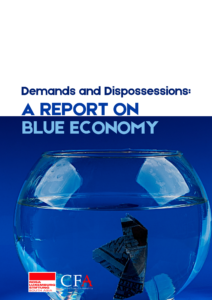 The blue economy is the next economic frontier. That’s the impression which has been created by the intergovernmental bodies and international financial institutions. National governments, business groups and private investors have also jumped into the bandwagon. The oceans are increasingly seen as spaces that need to be opened and developed in order to provide opportunities for economic growth in the coming future. What needs to be recorded is that this economic roadmap to capture the oceanscape is drawn from a logic of environmental protection and conservation, particularly in the name of addressing the Sustainable Development Goal 14 (SDG14) or ‘Life Under Water’. In the next decade, the economic activities in and around the oceans is estimated to generate USD 3-6 trillion wealth and 40 million jobs, thus making the ocean economy the world’s seventh largest (see here and here). Given the use of the term ‘frontier’, the blue economy, as scholars have pointed out, demands the closure of spatial frontiers and opening up of new regulatory and ethical frontiers to generate a cycle of opportunity and dispossession. The dominant view of the oceanscape, backed by big capital inflows, that revolves around exploring and celebrating the economic and financial potential of the oceans thus simultaneously suppresses the voices of those who have traditionally viewed, depended and accessed the oceans and coasts as commons.
The blue economy is the next economic frontier. That’s the impression which has been created by the intergovernmental bodies and international financial institutions. National governments, business groups and private investors have also jumped into the bandwagon. The oceans are increasingly seen as spaces that need to be opened and developed in order to provide opportunities for economic growth in the coming future. What needs to be recorded is that this economic roadmap to capture the oceanscape is drawn from a logic of environmental protection and conservation, particularly in the name of addressing the Sustainable Development Goal 14 (SDG14) or ‘Life Under Water’. In the next decade, the economic activities in and around the oceans is estimated to generate USD 3-6 trillion wealth and 40 million jobs, thus making the ocean economy the world’s seventh largest (see here and here). Given the use of the term ‘frontier’, the blue economy, as scholars have pointed out, demands the closure of spatial frontiers and opening up of new regulatory and ethical frontiers to generate a cycle of opportunity and dispossession. The dominant view of the oceanscape, backed by big capital inflows, that revolves around exploring and celebrating the economic and financial potential of the oceans thus simultaneously suppresses the voices of those who have traditionally viewed, depended and accessed the oceans and coasts as commons.
India is not outside the blue economy hullabaloo. About 4 million fisherpeople are dependent on the coastal economy and the blue economy contributes to 4.1 percent of the country’s GDP. Over the last decade in particular, the Government of India has therefore undertaken a series of policy decisions to boost economic activities around the oceans. New ports are built and rebuilt, industrial corridors and coastal economic zones are set up, beach resorts are constructed for ocean tourism, large scale fishing and deep sea mining are being encouraged. What is happening to the small-scale fisherpeople and those who have been traditionally dependent on the coastal ecosystem, what is happening to the spaces which are considered commons, and who are now the masters of the seas? These questions seem to be eclipsed behind the rhetoric of economic growth and sustainability. This report aims to understand the blue economy model and its implications for the frontline communities, and document the stories of dispossession, the grabbing of the natural resources and degradation of the marine ecosystems done by the blue economy programmes.
Read and download the report here: Demands and Dispossessions_ A Report on Blue Economy
